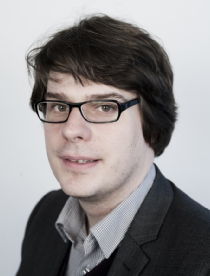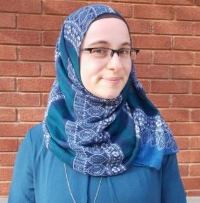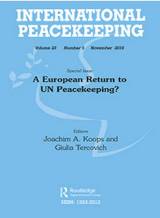Other News
Gabriel Siles-Brügge gives evidence on TTIP to Spanish regional parliament
 Gabriel Siles-Brügge, Associate Professor in PAIS, recently gave evidence to the parliament of the Spanish region of Extremadura based on his research on the Transatlantic Trade and Investment Partnership (TTIP) - published most recently as a book with Polity Press and an article in New Political Economy.
Gabriel Siles-Brügge, Associate Professor in PAIS, recently gave evidence to the parliament of the Spanish region of Extremadura based on his research on the Transatlantic Trade and Investment Partnership (TTIP) - published most recently as a book with Polity Press and an article in New Political Economy.
Speaking via videolink to the special committee investigating the effects of TTIP for the region of Extremadura, he stressed that the economic benefits of the agreement were overblown, that the agreement was unlikely to lead to the protection of the region's denominations of origin in the US and that its likely effects were predominantly to encourage subtle deregulation.
To see a video of the session (with Gabriel's intervention starting around 2:05:33), follow this link: http://www.asambleaex.es/comision-2495 (in Spanish)
Alexandra Dobra selected as a finalist to present her innovative idea at the “Falling Walls Lab Finale” in Berlin
PAIS PhD candidate, Alexandra Dobra, has been selected as a finalist to present her innovative idea at the “Falling Walls Lab Finale” in Berlin - "The brightest minds on the planet” BBC - presided by the Chairman of the Board of the Nobel Foundation.
Alexandra’s innovative idea, the "High-Performance Corporate DNA Transformation Model” aims to break the walls of unethical corporate behaviour. Following 2007, investment banks have been under the spotlight for unethical corporate behaviour. They responded by implementing new core control systems, organisational structures and (formal) corporate cultures. Nine years later, these investment banks continue to incur damages due to unethical corporate behaviour and to drive down social value. So how can this be fixed? The "High-Performance Corporate DNA Transformation Model”, that Alexandra has developed as part of her PhD thesis, answers how this can be fixed. The "High-Performance Corporate DNA Transformation Model” shall be commercialised by Swiss Economics, a leading independent consulting company with proven experience in supporting companies, associations and public authorities in regulated industries.
Falling Walls is a unique international annual gathering of leaders from science, business, government, and the arts. Inspired by the peaceful fall of the Berlin Wall on 9 November 1989, the question of every Falling Walls meeting is: Which are the next walls to fall - in science and society? The meetings are acclaimed for the high-level speakers, the brevity of presentations, the diversity of issues and the amicable open atmosphere. The Falling Walls Foundation, a charity, is generously supported by the German Ministry of Education and Research, the Helmholtz Association, the Robert Bosch Stiftung, the Berlin Senate, and numerous other acclaimed academic institutions, foundations, companies, non–governmental institutions and individuals.
Many congratulations, Alexandra!
Jennifer Philippa Eggert To Give Talk at American University of Beirut
 ESRC Doctoral Research Fellow Jennifer Philippa Eggert will be giving a talk at the American University of Beirut in Lebanon on 24 October. Jennifer will present findings of my research on female fighters during the Lebanese Civil War.
ESRC Doctoral Research Fellow Jennifer Philippa Eggert will be giving a talk at the American University of Beirut in Lebanon on 24 October. Jennifer will present findings of my research on female fighters during the Lebanese Civil War.
Abstract: What role do women have in times of war and violent conflict? In much of the literature on political violence, the role of women is either completely omitted or women are seen as victims or actors for peaceful change only. The fact that in most conflicts worldwide, women, too, perpetrate and facilitate violence is often overlooked. This is no different in the majority of the literature on the Lebanese Civil War, despite the fact that women played an active role in practically all militias that were operating in Lebanon during the war. Taking into account individual motivations, organizational characteristics, societal factors as well as the security context, this talk explains the phenomenon of female fighters during the Lebanese Civil War. Based on interviews with former militia members, it undertakes a comparison of women’s inclusion in the different politico-military groups that were active during the war and highlights why women were employed as combatants in some of the militias, whereas they assumed supportive roles only in others.
Keith Hyams awarded GCRF Funding on Resilience
Dr. Keith Hyams has been awarded a grant from the RCUK Global Challenges Research Fund (AHRC-ESRC-NERC) for a project on 'Why We Disagree About Resilience'.
The project will involve working on urban resilience with partners across several disciplines in Cape Town, Nairobi and Manilla. The funding will further strengthen PAIS's work on Ethics in International Development.
Giulia Tercovich edits the latest Special Issue of International Peacekeeping
 PAIS GEM Fellow Giulia Tercovich has edited, together with Prof. Joachim A. Koops (Vesalius College Brussels), the most recent Special Issue of International Peacekeeping titled ‘A European Return to United Nations Peacekeeping?’.
PAIS GEM Fellow Giulia Tercovich has edited, together with Prof. Joachim A. Koops (Vesalius College Brussels), the most recent Special Issue of International Peacekeeping titled ‘A European Return to United Nations Peacekeeping?’.
The main rationale of this collection of articles is to provide in-depth case studies of a selected sample of European countries in order to assess the opportunities, challenges and future possibilities of a ‘European return to UN peacekeeping’. The articles consist of both policy papers and theory-guided research in order to connect the analysis of recent and policy-oriented developments to wider and more general theoretical debates on the supply of peacekeeping troops and on the history, track-record and future potentials of European approaches to blue helmet operations.
The issue takes stock of nine key European countries: France (Thierry Tardy), UK (David Curran and Paul D. Williams), Germany (Joachim A. Koops), Italy (Giulia Tercovich), The Netherlands (Niels van Willigen), Ireland (Raymond Murphy), Denmark (Peter Viggo Jakobsen), Sweden (Kristina Zetterlund and Claes Nilsson) and Norway (John Karlsrud and Kari Osland).
The Special Issue is available here: http://www.tandfonline.com/toc/finp20/current
